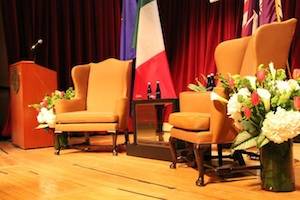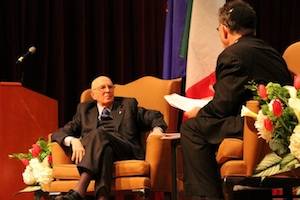Giorgio Napolitano, a Cosmopolitan Italian
I can't count how many times I've been asked, especially abroad: " If Napolitano is the President of Italy why is he not the one making the decisions? Why don't we see him more on TV?".
Napolitano, for many, is the embodiment of an ideal moderator, someone who, while never betraying or hiding his personal moral convictions, manages to be honest, impartial and neutral. Even when I was younger, I would look up to him almost as a “wise man” figure, one of the few who managed not to be tangled in the highly politicized tension – but not out of passivism - quite the opposite - getting things done even without executive power.
He represents the highest, most complex, educated and multi-layered side of Italy: the one that you don’t really see on TV in both continents…the one I associate to my grandparents, who filled my house with books and culture, the one that often you really can’t get at a first glance. An Italian who speaks English fluently and deeply understands the jurisdictional system of other countries, their culture and who carries within him decades of History. He is sharp, rational and precise, and at the same time passionate and funny.
It was a breath of fresh air, after looking at Italy from afar for years, to walk around my college campus, NYU, enter the beautiful patio filled with trees and benches of the Law School and join hundreds of other people – and a lot of young Law students – to listen to Napolitano talk, interviewed by Professor J.H.H. Weiler, Director of the prestigious Jean Monnet Center.
The interview style - direct and with the typical “American” focus on personality, life-defining moments, inspiring thoughts and overarching themes – truly brought out some heartfelt memories.
The President – without sentimentalism – took us with him to the streets of Naples in 1943: he described the fear during dozens of nights spent in an underground shelter where aristocrats, as well as upper middle class men and women, and poor people, had to seek refuge from the bombs; and then he made us feel the excitement after the Allies arrived, describing how the Americans, mingling with the Neapolitan population, where never perceived as an occupying force and when Mussolini resigned and was taken away by the “carabinieri”.
He said it was a coming of age moment for him, that deep intuition that he suddenly had when he realized that the only way for Italy to survive was to lose the war. It wasn’t about winning, it was about fighting for the right cause.
A cause that wasn’t necessarily the same one of his own parents, a middle class family that Napolitano described as “not fascist but not an anti-fascist either”. Much like Napolitano, though, his family was far from stereotypical. His father admired Benedetto Croce, an idealist philosopher, who was concerned with aesthetic philosophy, economy, history and politics and was then a deep influence on Antonio Gramsci, a founding member of the Italian Communist Party.
His mother was a practicing catholic from Naples not only influenced by southern manners and ideas, since both of their parents were from Piedmont, related also to another prominent intellectual and philosopher, Norberto Bobbio.
Napolitano talked about his love for theater, how he acted in a one act play as a young man but also how he loved writing essays and comments, he mentioned his favorite playwrights, Ibsen and Chekov, the books that instilled in him a passion for politics, especially the Letters from Prison by Antonio Gramsci.
After the Cold War and McCarthysm, for an American it’s hard to really contextualize Italian communism. Just the mention of the word communism even nowadays carries with it the shadow of Stalin’s crimes and of a “rebellious” extremist and somewhat naïve agenda. While these idea are completely justified by history, it’s important to remember that in Italy it meant being an anti-Fascist first of all, and it actually linked together some of the most brilliant and multi-faceted intellectuals, economists, writers of the educated Italy, not necessarily the extremist one.
The focus of the lecture, though, centered on the State of the European Union. Napolitano underlined the positive process of the democratization of Europe and tried to focus on the disjointedness of its system and the issue of political participation. Europe, just a few years ago, was still made up of national states, and the Parliament might have created even a bigger distance between those elected and the electors. Still Napolitano thinks that the European Union is a great achievement and it can only improve.
While there were periods when it might have been more “popular” (during the economic growth that the Euro brought along when states like Spain radically changed, developing immensely economically in a short span of time) Napolitano thinks that the problems are not in the Union itself but in the fact that it is used as a “comfortable scapegoat” by politicians and citizens alike.
It was discussed how even after there is a bigger coherence after The Treaty of Lisbon, Barack Obama, for example, on the verge of today's war with Lybia, still refers to the individuals instead of a strong political organ that codifies the position regarding war, peace or certain laws of the entire Union.
Napolitano commented on the crisis in Lybia and gave an important advice to the leaders, saying that they should not be conditioned by elections but that they have to lead with their ideas.
Napolitano also deconstruncted the complicated issue of anti-Americanism in Europe. On one hand Europe, and Italy especially, has almost an unconscious admiration for America and still looks up to it, there are countries in which this sentiment often comes to the surface. Napolitano assured that Italy is really not one of them; he joked that Italy doesn’t “have a superiority complex” and while there was a moment in which Italy aligned itself with the Soviet block and in the youth culture ideas against American imperialism, it was all very contained and didn’t last long.
He recalled his visit to the most prestigious Ivy League universities in 1975, after a struggle to get a visa due to his political sympathies and declared that this is a delicate moment for Italy, torn by “hyper-partisanship, a daily guerrilla, a reciprocal deligitimization” and his job is to put an accent on what unites, particularly during the 150th anniversary of the country’s unification, to inspire more trust, and more political conscience.
The lecture ended with a reflection on immigration and a comparison between Italy and the States. With what is happening during these hours in Lampedusa (thousands of immigrants coming from North Africa to Italy) it seems obvious that there isn’t a clear European immigration policy and it is impossible to even implement simple principles.
Napolitano emphasized how it’s important to have regulations like in the United States and a welcoming and yet organized immigration policy.
In this serious and honest interview Napolitano recalled the difficult times during the 1970s in Italy, when terrorists and the Red Brigades created a tense political climate, his most gratifying battles, such as when he managed to nationalize electric power plants, and his intellectual inspirations such as Thomas Mann and Eugenio Montale.
Giorgio Napolitano received the NYU Presidential medal, given annually at the Emile Noel Lecture for extraordinary achievement. It wasn’t just an award to an important politician but to a full-fledged individual, who has always combined different passions, politics and culture, Italy with cosmopolitism.



































i-Italy
Facebook
Google+
This work may not be reproduced, in whole or in part, without prior written permission.
Questo lavoro non può essere riprodotto, in tutto o in parte, senza permesso scritto.